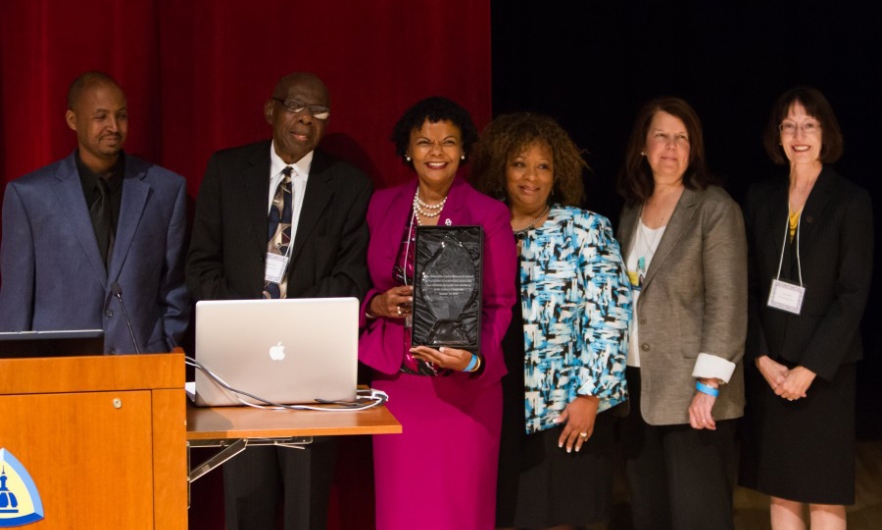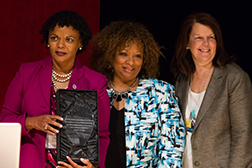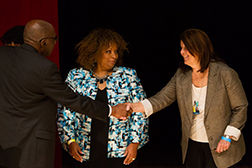The Pythias A. and Virginia I. Jones African American Community Forum on Memory Loss


UHI Presents the Fifth Annual Henrietta Lacks Memorial Award to the Pythias A. and Virginia I. Jones African-American Community Forum on Memory Loss
Former State Senator Verna Jones-Rodwell was only 9 years old when her mother began displaying symptoms of memory loss. At first they were subtle: hot dogs left on the stove too long, a missed birthday, a wrong turn. Nothing that couldn’t be explained.
Over time, though, the symptoms grew more noticeable. Her older sister, Ernestine Jones Jolivet, was a school teacher with two young children. She became alarmed when the mother she depended on for help with her own children became distant and unreliable.
“We thought she was depressed. We had no idea she had Alzheimer’s disease,” Jolivet said. She was one of five siblings; Jones-Rodwell was the baby of the family. One of their brothers was a medical student, however. It fell on his shoulders to try to explain the diagnosis to the family. Their initial reaction was shock and confusion. They didn’t know where to turn.
“To be very honest, after we first got the diagnosis, we didn’t share it immediately. We were ashamed. When you hear about someone losing their memory, someone not as sharp as they used to be, there’s a stigma,” Rodwell-Jones said.
Years later, when their father was diagnosed with dementia, they faced the same trials a second time. After his death, “We thought no one should have to go through what we went through as a family,” Jolivet said. Together, the two sisters asked that donations be made to the Alzheimer’s Association and earmarked for African American outreach and education. From their contributions was born the Pythias A. and Virginia I. Jones African-American Community Forum on Memory Loss, winner of the 2015 Henrietta Lacks Memorial Award.

A university-community partnership led to the development of the Forum, an annual, day-long event for families of individuals with Alzheimer’s disease, dementia, or other illnesses that create memory loss. The Forum is the product of a collaboration between the Johns Hopkins Memory and Alzheimer’s Treatment Center, the Alzheimer’s Association, Greater Maryland Chapter, Coppin State University and the Baltimore City Health Department Division of Aging and Care Services.
Now in its 11th year, the Forum provides information on research and clinical trials, support services and other resources to hundreds of Baltimore families.
The Jones family struggled for years on their own. Their first attempt to seek help from a support group left them stunned, because they were the only African-Americans in the room. Eventually, desperate for information and help, they decided to return to the support group even though they didn’t know anyone.
That was a huge leap of faith, according to Crystal Day-Black, assistant professor at Coppin State University and one of the Forum’s organizers. “There’s a distrust with agencies, with doctors, with hospitals. We don’t go and seek out services. We don’t go to support groups,” she said. Day-Black explained that African American families have a tradition of caring for their elders at home, so they don’t tend to reach out for help. “So if they don’t come to us, we have to go to them.”
By presenting the Forum at Coppin State, families have a familiar, comfortable space to ask questions, network and find support, Day-Black said. “It’s important to develop a trusting relationship with those who can tell us about the disorder, about treatment, about care. That’s been the biggest (success) that has happened with the Forum—we’re developing trust in the community. Coppin, as a historically black college and institution, is trusted in the neighborhood.”
For the Alzheimer’s Association, the Forum represented an opportunity to reach an underserved population in the community. “We recognized that our organization did not reflect the community we were serving,” says Cass Naugle, executive director. “This Forum has had a wonderful impact on the community, as well as on our organization. We have seen increases in African American participation in just about every aspect of our organization—in our services, care consultation, our helpline, our support groups—and now we actually have people who look like the community we’re serving delivering those services. “
The event also gives student nurses a chance to interact with the community and learn from families. Day-Black told the story of a woman who attended the Forum for the first time several years ago. “She sat in the hallway and cried, for two or three hours. Different students kept going up to her and saying ‘Are you okay? Can I sit with you?’ It was literally the first time that she had been able to get out of the house. She had five brothers and sisters and no one would help her with Mama. The students rallied around her, gave her love and support, gave her some references.”
Because of her experience with the students, the woman came back the next year, and the year after that. She kept coming back, even after her mother passed away. Last year, she said, “I’m working in my church. I’m volunteering. I’m mentoring other families who are going through the same experiences.”
The kinds of connections forged between participants help families go from feeling like victims to victors, Rodwell-Jones said. Families are empowered by realizing they have access to information and sources of support.
“The Forum is an inspiring example of what is possible when Johns Hopkins and the community work together,” says Robert Blum, director of the Urban Health Institute. “This collaboration has created a model for engagement with the Baltimore community that transforms lives.”
All of the partners expressed their gratitude for the award, and the hope that it will allow them to expand their work.
“Winning this award is so humbling. I am honored just by the fact that this award is in place,” Jones-Rodwell said, adding that each year new families attend the Forum, demonstrating that there is still a need for their program.
As the 2015 winner of the Henrietta Lacks Memorial Award, the Forum received $15,000 in support and was honored at the Henrietta Lacks Memorial Lecture on Oct. 10.
The Henrietta Lacks Memorial Award was established in 2009 in honor of former Turner Station resident and Johns Hopkins cancer patient Henrietta Lacks, whose cells helped scientists make ground-breaking advances in medical research. The award is intended to be an enduring reminder of her contribution to medical science and to her community.
You can view The Pythias A. and Virginia I. Jones African American Community Forum on Memory Loss' Henrietta Lacks Memorial Award Video here
